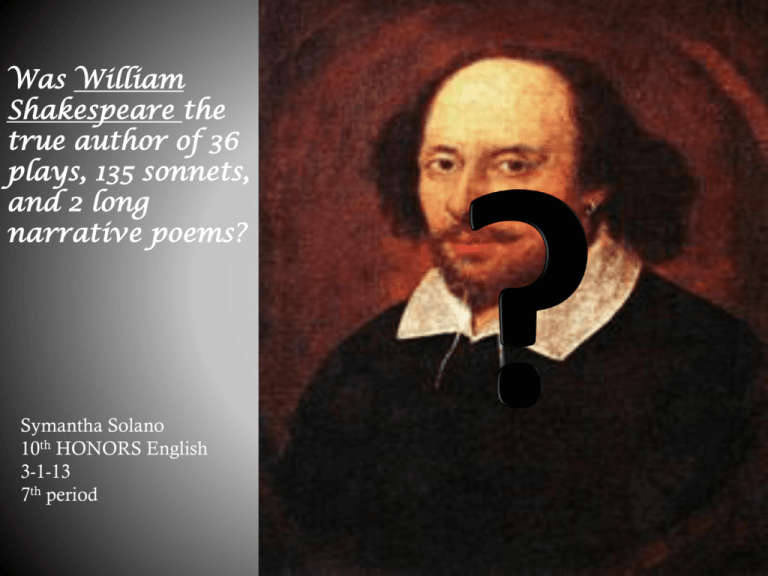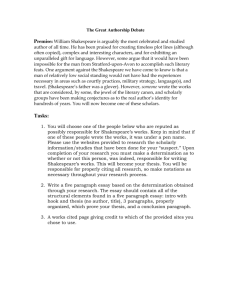Shakespeare- Corbett 2013
advertisement

Was William Shakespeare the true author of 36 plays, 135 sonnets, and 2 long narrative poems? Symantha Solano 10th HONORS English 3-1-13 7th period William Shakespeare Shakespeare's authorship was first questioned in the middle of the 19th century, when adulation of Shakespeare as the greatest writer of all time had become widespread. Shakespeare's biography, particularly his humble origins and obscure life, seemed incompatible with his poetic eminence and his reputation for genius, arousing suspicion that Shakespeare might not have written the works attributed to him Supporters of alternative candidates argue that theirs is the more plausible author, and that William Shakespeare was not plausible for his work due to the lack of knowledge he possessed pertaining to the royal court system. http://en.wikipedia.org/wiki/William_Shakespeare William Shakespeare continued… Only a small minority of academics believe there is reason to question the traditional attribution Contemporary comments and textual studies support the authorship of someone with an education, background, and life span not consistent with that of William Shakespeare. Edward de Vere 17th Earl of Oxford Aristocratic, educated first privately, then at Cambridge and Gray's Inn. George Puttenham says he knows men in the Court that have written many books, and they have published their books without their own names as if it was a bad thing for men to seem knowledgeable. The first one he knows is the noble gentleman Edward de Vere, Earl of Oxford. An English professor named J. Thomas Looney, proposed Oxford as a candidate for the authorship of Shakespeare's works. His theory was based on perceived analogies between Oxford's life and poetic techniques in Shakespeare's plays and sonnets. http://en.wikipedia.org/wiki/Oxfordian_theory_of_Shak espeare_authorship Edward de Vere continued… Theories were based on perceived analogies between Oxford's life and poetic techniques in Shakespeare's plays and sonnets. It supplanted an earlier popular theory involving Francis Bacon. Academic consensus rejects all alternative candidates for authorship, including Oxford. Christopher Marlowe Corpus Christian College, Cambridge This talented, bohemian dramatist from the Elizabethan era died in 1593 --at the age of 29 (the same age as the Stratford man in that year) and on the eve of the publication of Shakespeare's works. When Christopher Marlowe died, his supporters point to irregularities in the coroner's inquest, and they suppose that Marlowe did not really die in that year but lived on to write the works of "Shakespeare," a subterfuge necessitated by the "official cover-up" of his documented activities as a spy for the crown. But the inquest irregularities do not prove that Marlowe didn't die; conceivably they have been fabricated to cover up the true cause of his death, but not the fact that he did die, a scenario which is wholly void of any positive evidence let alone conclusive proof. Shakespeare: Christopher Marlowe Theory http://www.youtube.com/watch?v=QTM0 wW2SNlU&edufilter=ItIg2V4IIX_lr6ECGXKr ag http://vpt.littlefoible.net/people/cast-marlowe.html Christopher Marlowe continued… Christopher Marlowe’s death was supposedly faked so that he was not faced with almost certain execution on charges of subversive atheism. As stated, there were noted some irregularities in the coroner’s inquest. What it does not state is exactly what was so “irregular” about it? What specific details did the coroner either miss or misjudge? Or did the coroner simply just make a stupid mistake? No one is definite on what the inquest irregularity truly was. In that case, for all anyone knows Christopher Marlowe could’ve died from anything at the time he was actually pronounced dead. Francis Bacon Sir Francis Bacon was the first alternative candidate proposed as the true author of Shakespeare's plays and was the leading candidate in the nineteenth and early twentieth century. It is difficult to imagine that Francis Bacon, with the full life he led and his other numerous literary and official preoccupations, could have also composed 36 plays, 154 sonnets and 2 long narrative poems of the quality these works exhibit. Though both Bacon and Shakespeare had wide knowledge of the law, Shakespeare's usages of legal terminology, unlike Bacon's, are richly metaphorical. Francis Bacon did not possess the keen intellect and sophistication that William Shakespeare possessed. http://www.youtube.com/watch?v=QTM0wW2SNlU&edufilt er=ItIg2V4IIX_lr6ECGXKrag Francis Bacon continued… Francis Bacon lived a life full. For example , his books that he himself wrote and published with his own name, are significantly different from the works of William Shakespeare. http://blogs.law.yale.edu/blogs/rarebooks/a rchive/tags/English+law/default.aspx http://smu.edu/bridwell_tools/exhibits/Science&Re ligion.htm William Cecil, Lord Burghley (Edward de Vere) In 1571, Edward de Vere took a step that ensured the Elizabethan State's retention and intensification of its more than passing interest in him when he was betrothed (with apparent reluctance) to the fourteen year-old daughter of William Cecil. As Master of the Court of Wards who - by his arrangment of this marital bond between Oxford and his daughter in order to ennoble his family William Cecil was duly elevated to the peerage as the first baron Burghley, and Edward de Vere became the son-in-law of the most powerful man in England. In ensuing years, after a difficult marriage and prior to an all-too-early death, Anne bore Oxford three daughters who survived to adulthood: Elizabeth—whose legitimacy, however, Oxford bitterly disputed—as well as Bridget and Susan. All three of Oxford's daughters, very interestingly, either married or were proposed for marriage to the three men (the only three men) to whom the poems and plays of Shakespeare were dedicated—the earls of Southampton, Montgomery and Pembroke). If William Cecil is the real Shakespeare, then he dedicated the poems and plays to his grandsons. If Edward de Vere is the real Shakespeare, then he dedicated his works to his son-in-laws. http://www.nndb.com/people/243/000102934/ William Cecil continued… Due to his role as guardian and father-in-law to Edward de Vere, 17th Earl of Oxford, William Cecil figures largely in the Oxfordian theory of Shakespeare’s authorship. Proponents of this view claim that the character of Polonius in Hamlet is a parody of Cecil, an interpretation which a minority of mainstream scholars have agreed with. Born in 1520, Burghley was Elizabeth's principle Secretary of State. More Protestant than the Queen but less Puritan than Walsingham, Burghley was a consummate handler of the Queen at her best and worst. William Cecil is the true Shakespeare. Cecil clearly possessed the qualities and knowledge of the royal court system that none of the other candidates held. “William Shakespeare” showed extremely high amounts of knowledge regarding the royal court system.







